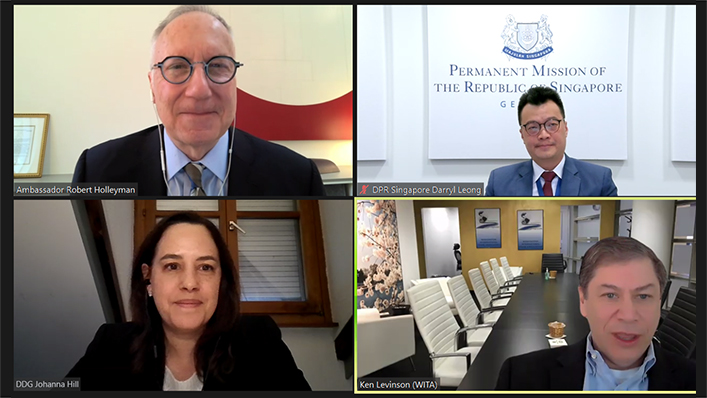
DDG Hill emphasized the importance of the services sector for the global economy and for international trade. She noted that services accounts for the majority of economic output worldwide, representing on average 67% of global GDP and half of all jobs. This represents a great potential for trade. She pointed out that services already accounts for 50% of global trade in value-added terms.
DDG Hill underscored the relevance of the disciplines in the WTO’s General Agreement on Trade in Services (GATS). The GATS provides rules-based, transparent and predictable conditions under which services businesses, both large and small, can operate, she said. DDG Hill noted that WTO members could increase the use of the valuable tools that exist within the Agreement and step-up policy attention devoted to the sector. DDG Hill highlighted in this respect the importance of ensuring a modern WTO services framework that serves all members, including developing countries.
She also pointed out that services and services trade are at the forefront of the digital revolution. In 2022, 54% of total global services exports were delivered digitally. Discussing the benefits of services trade and e-commerce, DDG Hill emphasized their role as a development tool for low- and middle-income countries. Between 2005 and 2022, the value of services exports from developing countries increased by over 280% and from LDCs by nearly 350%, compared to growth for services exports from developed economies just short of 135%. While low base effects might be part of this story, it is clear that services trade is fuelling business activity, growth and job creation, she said.
Digital trade, for its part, provides increased access to global markets and flexible work opportunities, which is an important tool for socioeconomic inclusion, given its positive impacts on the employment prospects of women and young workers. A large share of micro, small and medium-sized enterprises supply services, including through electronic means. Connecting more of them to international markets would help broaden the distribution of the gains from trade. DDG Hill referred in this regard to a recent report on Digital Trade for Development published jointly by the International Monetary Fund, the Organisation for Economic Co-operation and Development, the United Nations Conference on Trade and Development, the World Bank and the WTO. The report outlines the potential gains from digital trade for developing economies and the role of domestic policies in achieving these gains.
DDG Hill recalled the words of the WTO Director-General, Ngozi Okonjo-Iweala, stressing that the future of trade is services, in addition to being digital, green and needing to be inclusive.
Share Reach us to explore global export and import deals